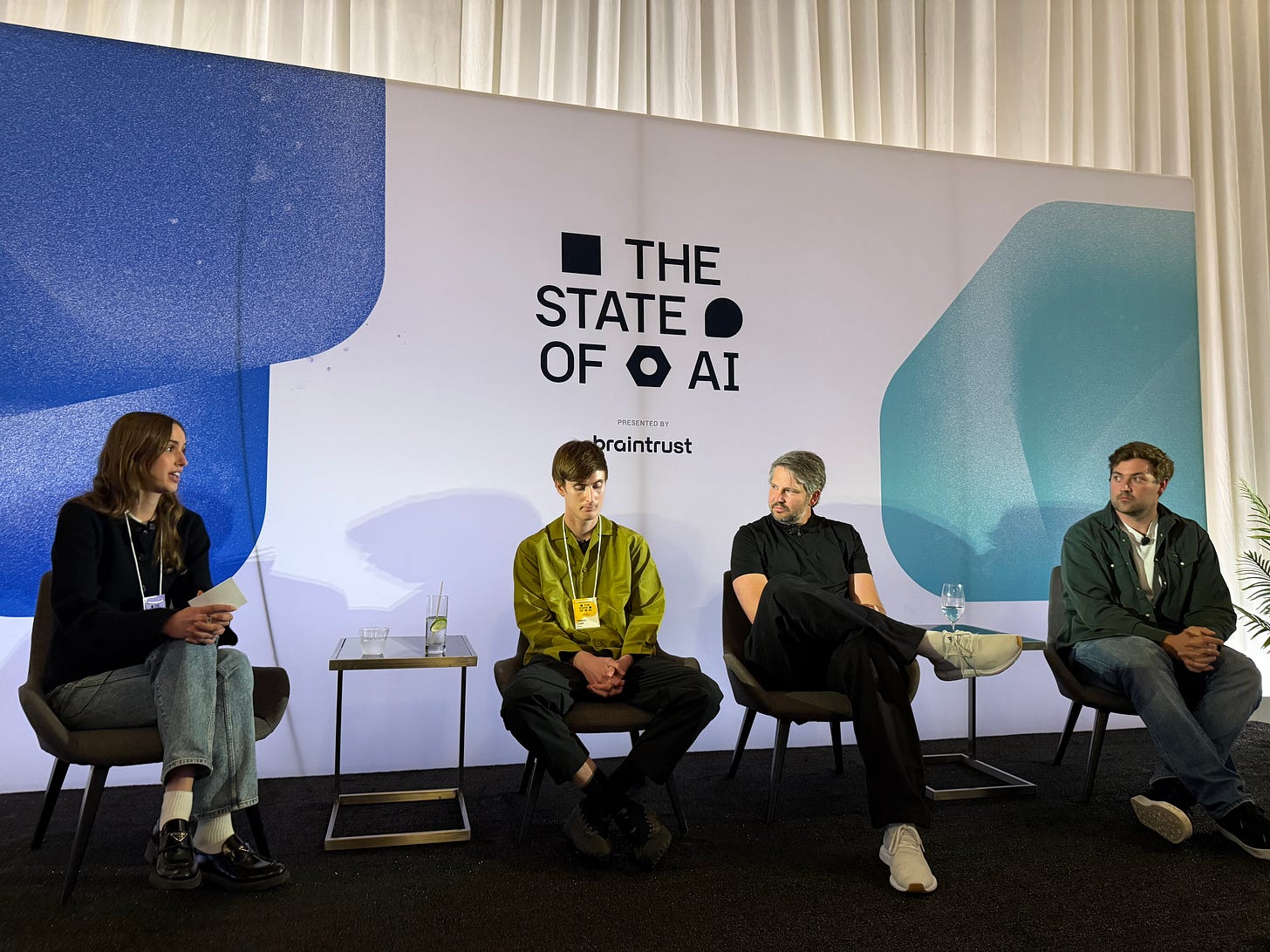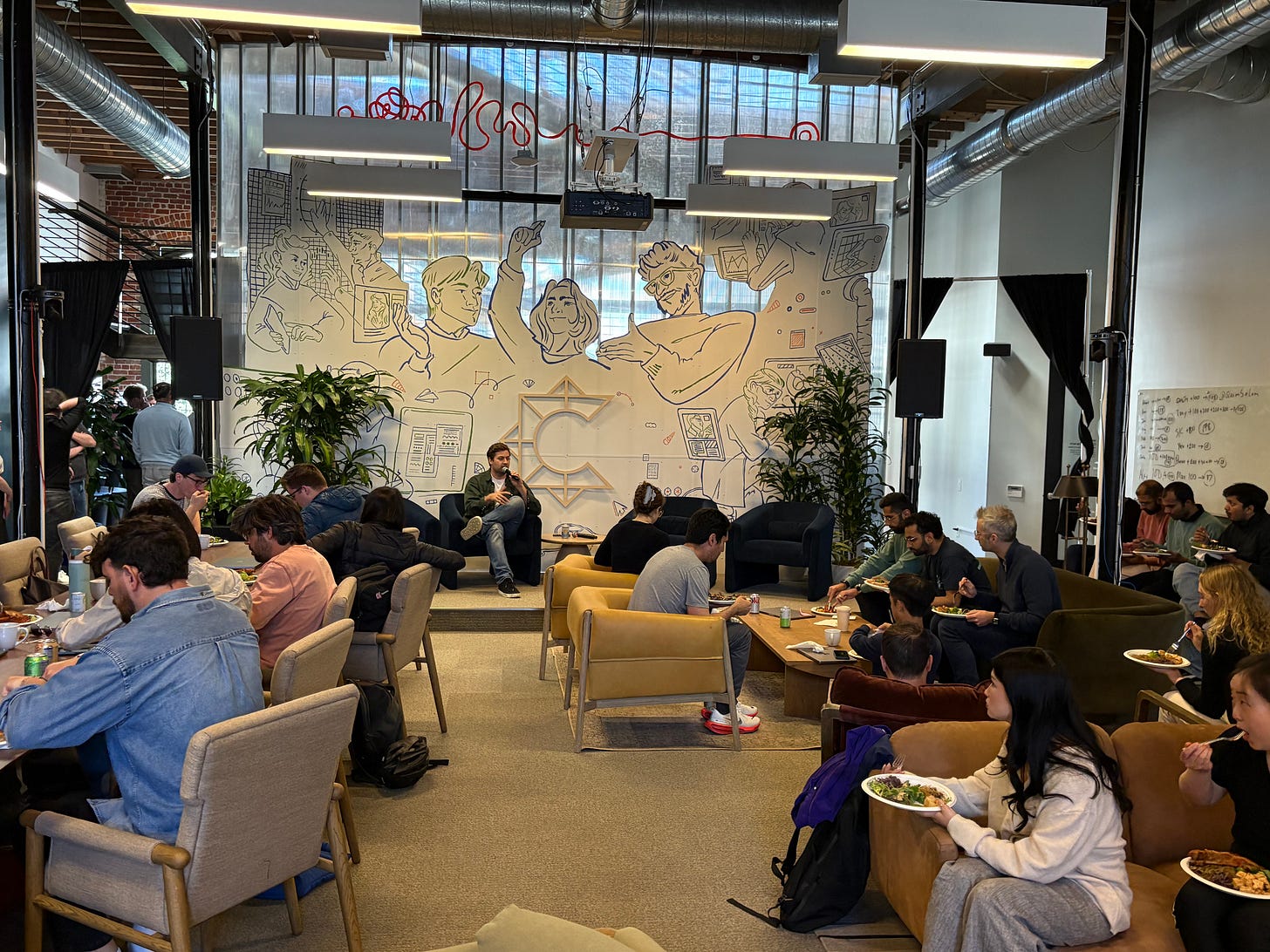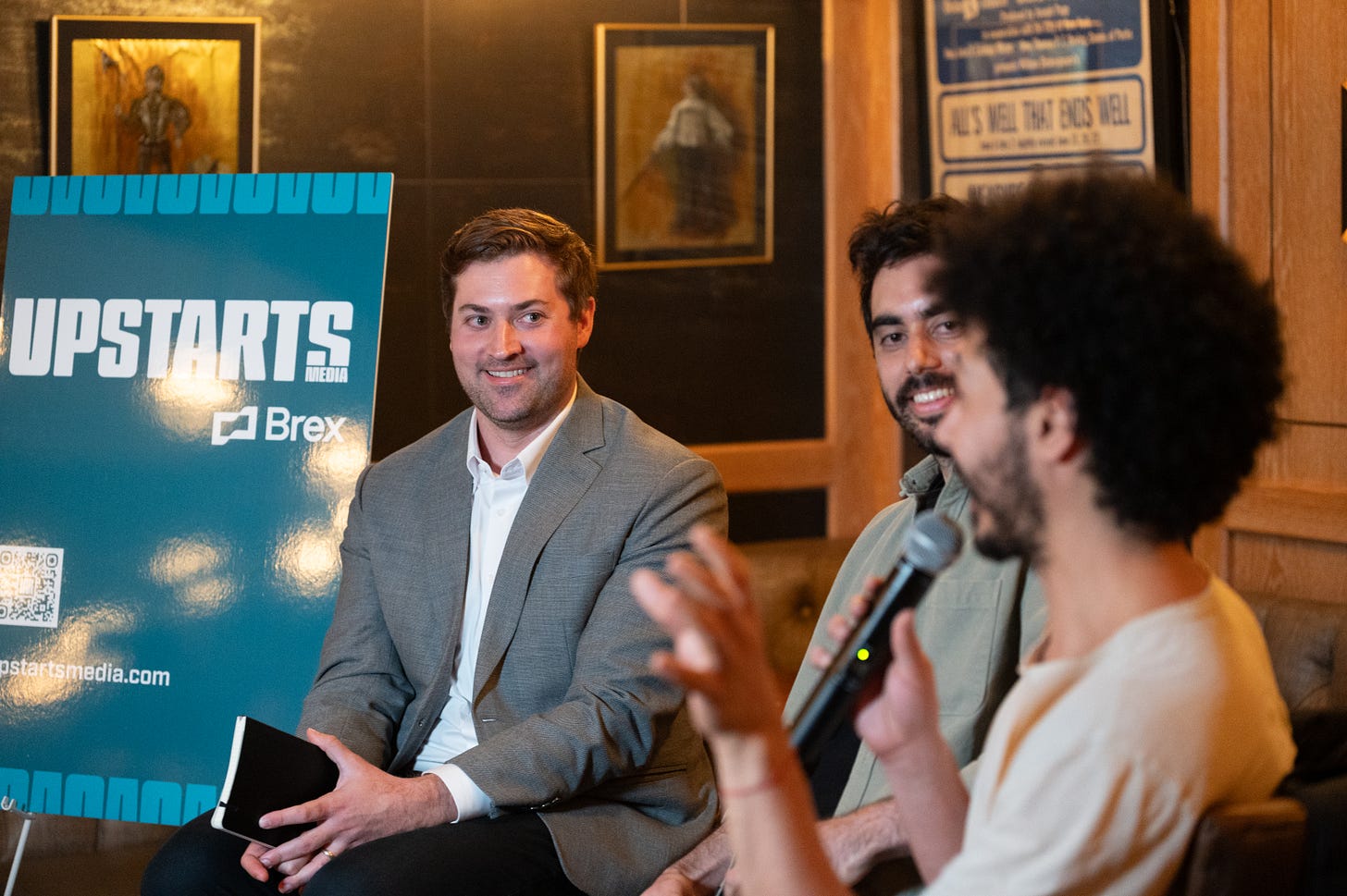Another Startup M&A Target, And The Top Things Upstarts Heard Visiting Silicon Valley
A week of speaker appearances at Startup Grind, South Park Commons and the State of AI summit armed Upstarts with deal scoops, founder insights into ‘vibe coding’ – and an appreciation for home.

It’s the season for events – and, increasingly, acquisitions – in startupland. Upstarts has had a front row seat for both.
After our Launch Party in New York to close out April, Upstarts hit the road last week for Silicon Valley. At Startup Grind in Redwood City, I met with founders and investors to get a sense of what startups should be thinking about right now, then had the tables turned on me as I appeared on the main stage to talk about reporting on AI.
Up in San Francisco, we walked a lot more than anticipated (thanks, RSA, for claiming every Waymo), talked press tactics with a bunch of smart early-stage founders at South Park Commons, and appeared as the seemingly only humanities major onstage at the State of AI gathering hosted by AI startup Braintrust.
Across these events, a few themes emerged: startup M&A is heating up; everyone’s thinking about ‘vibe coding,’ a new trend of using AI editors to ship code faster, and its limits and rivalries; it’s a chaotic global environment; founders want to make do with less.
More on those highlights – including the identity of another startup that Datadog tried to buy before acquiring Eppo for $220 million, a scoop Upstarts broke on Thursday from a San Francisco hotel room – as well as thoughts from some of the notable founders who spoke with Upstarts on our tour – later in this edition.
First, the most consistent takeaway for Upstarts: there’s a seemingly impossible amount of startup news happening right now. Trying to follow it all – let alone report on it – is a sucker’s game. But you, our Upstarts community, already know that. It’s why you’ve subscribed and shown up in numbers to support us in person and on social media, and by amplifying our stories. I am so deeply grateful for it all, and it makes me feel even more purpose and responsibility to keep delivering.
As such, I’m glad to invite you to join Upstarts for our first Subscriber Meetup, to be hosted on May 13 by our launch partner, Brex, in San Francisco. Spots are first come, first served, but don’t worry: we plan to do a lot more of these soon, and not just on the coasts. If you think your local startup community would benefit from Upstarts visiting, drop me a line.
Now, let’s dive into more previously-unreported embers in the red-hot startup acquisition market, and some of my other favorite things we heard on the ground recently.
Presented by our launch partner, Brex.
Founders, there's a reason 1 in 3 US startups trust Brex: while you're working hard to change the world, Brex is working hard to help you spend smarter and move faster. With Brex, you get fast access to high-yield banking with same-hour liquidity, up to 20x higher card limits with bonus rewards, and automated expense processing and invoicing. Don't let tedious financial work stand between you and the future you're building.
To help you move even faster, Brex and Upstarts have partnered to offer subscribers up to $500 toward Brex travel or $300 in cash back, plus exclusive perks built to fuel your next big leap. Get started in minutes at brex.com/upstarts, trusted by leading companies like Anthropic, Mercor, ScaleAI, and Vanta.
Startup M&A heats up
It’s a good time to be an AI or data startup looking to cash out. OpenAI acquiring Windsurf, the coding tool known previously as Codeium, was a major conversation topic onstage and behind the scenes last week, with Bloomberg reporting yesterday that OpenAI has agreed to a price tag of about $3 billion.
But a lot of other startups are in play. On Thursday, we scooped another rumor: Datadog acquiring experimentation startup Eppo for $220 million, a deal that Datadog has since confirmed. Then yesterday, we broke another: Databricks is in advanced talks to buy startup Neon, maker of an open-source database engine, for about $1 billion.
In reporting the Eppo sale, we noted that Datadog had also approached a startup competitor named Statsig, which had rebuffed Datadog. “Statsig is expected to raise a new funding round instead,” I predicted, based on chats with sources. That also came true. This morning, Fortune reported that Statsig has raised $100 million at a $1.1 billion valuation following the approach.
But Statsig wasn’t the only startup that Datadog took a run at before landing on Eppo. Datadog also approached LaunchDarkly about an acquisition, five sources tell Upstarts. The deal didn’t come together after Datadog offered what one source described as a “cheap” price – what several believe was in a range below $2 billion – but LaunchDarkly held out for a price at, or closer to, its last private valuation of $3 billion reached in 2021.
LaunchDarkly and Datadog didn’t respond to comment requests, nor did LaunchDarkly investors.
LaunchDarkly is backed by Lead Edge Capital, Insight Venture Partners, Bessemer Venture Partners, Redpoint, Threshold, Uncork Capital, Bloomberg Beta and a number of others. For other buyers now priced out of Statsig and having missed on Eppo, it could still be in play at the right price, several of Upstarts’ sources suggest. And we’d bet that more deals will be flowing in the weeks to come.
Big companies want vibes
Duolingo’s posting of its all-hands email from CEO Luis von Ahn that the company would be going “AI-first” – with AI replacing contractors, and managers only hiring more staff after confirming AI couldn’t take on that work – was also backstage buzz. In the wider public, the decision has sparked backlash, particularly on TikTok, which led von Ahn to go into damage control on Bloomberg.
Among other CEOs at Startup Grind, however, his comments weren’t controversial. “I think everybody is going to follow his lead,” one public company CEO told Upstarts in passing. “The first 20 or so companies might announce it, but then the rest will just quietly do it.”
Another, Amplitude co-founder and CEO Spenser Skates, told Upstarts that it’s a top priority to make his analytics software company an “AI-first” one, too. But doing so is easier said than done with a company at scale, he added.
Amplitude, which went public in 2021 and now trades at a market cap around $1.2 billion, recently held a training for all of its engineering staff to use Cursor, a competitor to Windsurf. But implementation runs into various systems put in place with code that’s not compatible with ‘vibe coding’ tools like Cursor, added Skates, like code produced with programming language Java.
Then there’s the cultural challenge. Businesses used to a formal process of customer outreach, product requirement documents and coding processes can’t simply move it all over to coding tools, said James Evans, the former co-founder and CEO of Command AI, which he sold to Amplitude, and now head of AI at the parent company. “A lot of big company product thinking is trapped in the feature factory,” Evans said.
“You have to drag people kicking and screaming into the glorious future,” quipped Skates.
Lean startups are back in style

It’s been nearly fifteen years since technologist Eric Ries wrote ‘The Lean Startup,’ but AI is driving another moment for the concept.
Founders at South Park Commons were buzzing about Upstarts’ profile of Gamma, an alumni company that has reached $50 million in ARR off of just $23 million raised and 30 employees. At Startup Grind, Google DeepMind’s AI developer relations lead Paige Bailey talked up the power of small and open-source models for enabling small teams to make the most of generative AI’s capabilities.
“Founders are figuring out how to get more efficient with less,” she told Upstarts. “They can have full ownership of their company for a longer time, and also focus on building and not having to do a VC raise.”
Jyoti Bansal, co-founder and CEO of Harness and the former founder of AppDynamics, agreed. Bansal’s a fan of building startups within other companies. He tries to launch two or three startups internally within Harness, a developer operations software platform, each year; in February, he merged Harness with another company he co-founded.
Whereas in the recent past, Bansal preferred to launch a new potential product with one manager and five or six engineers, then scale to 15 or 20 when it finds product-market fit, those numbers can be downsized. Now, it takes only one or two engineers to get a minimum viable product running, Bansal said in between talks at Startup Grind.
“Maybe you need 5 engineers instead of 15,” Bansal told Upstarts.
Practitioners love evaluations
At the State of AI event, Upstarts spoke alongside AI leads from Notion, Vercel and companies you might not expect to have a strong AI presence, like the NBA. Some of the chatter was similar to Startup Grind in terms of the horse races happening: Cursor vs. Windsurf, AI app builders Bolt vs. Lovable, or customer support agent providers Sierra AI vs. Decagon, whose pending fundraise was another subject of chatter over the week – scooped last Friday night by my former colleagues at Forbes as a reported $100 million round at a $1.5 billion valuation.
But much of the chatter was around how to get more out of existing AI models and software systems, and Notion, Vercel and the rest were all on-hand to praise their host, Ankur Goyal of AI unicorn Braintrust, for the role played by evaluations that check how features built using the models are performing before and after their launch.
“The big takeaway for me is that evals have evolved from a defensive mechanism -- make sure you don't "break" when a new model comes out -- into a form of offense,” Goyal told Upstarts after the event.
The bubble is real

For Upstarts, visiting the Bay Area is frenetic, intellectually challenging and full of logistical learnings, like: don’t try to work in a Tesla Uber (the locals already knew this one). But it also can feel beyond parody. One hour in the Blue Bottle near South Park was great for social media content but also a reminder that, in certain coffee shops there, fundraising pitches are truly happening in ear shot constantly.
So after returning back to New York for a few days before our next visit, I was thinking of what AI unicorn founders Cris Valenzuela of Runway and Kareem Amin of Clay talked about at our Launch Party back in April.
Valenzuela told Upstarts he couldn't imagine building his company anywhere else, given the access to entertainment, media and culture that New York provides. Amin said he’d expected to want to build Clay in San Francisco. But when he visited, he found he was “missing that moment of connection” in its startup community.
“AI is moving so fast, so you need people who are very in touch with how it’s actually being used. If you’re too much in a bubble, you will miss how it’s impacting people and culture,” Valenzuela told the crowd of Founding Upstarts subscribers and local startup leaders and investors then.
Amin said he takes the local inspiration even further. Clay regularly buys out a local magic show in Brooklyn, 69 Atlantic, to bring employees and visitors together: “It’s re-enchanting the world for me.”




You brought up a great point about how hard it can be to keep track of the important news in this space. No only AI, but start up / investments areas in general.
Glad to be a subscriber and to have you as someone who can curate the most important information for us to focus on!